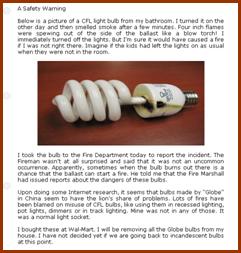Compact Fluorescent Lamp a Fire Risk?
 An article that surfaced in April 2010 on the Internet warned about a fire hazard associated with compact fluorescent lamps (CFL bulbs) and has been traveling the email circuit:
An article that surfaced in April 2010 on the Internet warned about a fire hazard associated with compact fluorescent lamps (CFL bulbs) and has been traveling the email circuit:
“Below is a picture of a CFL light bulb from my bathroom. I turned it on the other day and then smelled smoke after a few minutes. Four inch flames were spewing out of the side of the ballast like a blow torch! I immediately turned off the lights. But I'm sure it would have caused a fire if I was not right there. Imagine if the kids had left the lights on as usual when they were not in the room. “
This has been checked out by Snopes, and stamped FALSE.
According to the Snopes article, CFLs don’t burn out the way incandescent light bulbs do. Instead, as they near the ends of their lives, they grow dimmer. While some CFL bulbs merely stop emitting light when they finally quit working, others kick the bucket with a dramatic “pop” sound and then vent a distinct odor. A few even release a bit of smoke at their termination.
Healthy CFL bulbs may emit a bit of smoke and smell and have burnt-looking bases when they die, that that’s as it should be – there’s no fire danger to any of that, and indeed the bulbs are functioning properly when they act that way.
Get the full story from the source: http://www.snopes.com/inboxer/household/cflbulb.asp